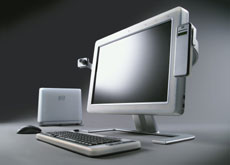 Microsoft and Hewlett-Packard are developing a concept computer code-named Athens to demonstrate technologies to be included in future products (serveral high-res photos are available). There isn’t much in this prototype that’s actually new and it’s more of a marketing tool than a technology demo. However, having putting a lot of simple and smart features together, they are on to something.
Microsoft and Hewlett-Packard are developing a concept computer code-named Athens to demonstrate technologies to be included in future products (serveral high-res photos are available). There isn’t much in this prototype that’s actually new and it’s more of a marketing tool than a technology demo. However, having putting a lot of simple and smart features together, they are on to something.
-
Screen real-estate
The demo model includes a $2000+ 20″ LCD (photo). The presented awknowledges that this is unrealistically expensive for the average business or home user, but cites a report that predicts that the same size screen will run about $400 in 2004 (presumably the end of 2004). Jakob Nielsen has been telling us this for years: large screens are not just for designers. There is a significant productivity gain from moving a typical user from a 15″ to a 17″ or 19″ display. -
Presence
A Microsoft researcher commented that a urinal can know when you walk away, but your PC can’t. I’ve written before about how user-presence should be done at the system (rather than application) level. This demo includes some nice moves on that front. Say I’m showing a small group a video or presentation on my PC. On hardware button (Do Not Disturb), and all of my communication systems are notified to leave me alone (incoming phone calls are diverted to voice mail, though callerID is available, and instant messaging status is set to “away”). -
PC as docking station
I’m now a full time laptop user, though I do plug in a mouse when at my desk. The Athens prototype is a docking station for a laptop as well as a PC. -
Unified Inbox
With telephony (the most hilarious word ever) technology built into the system, voicemail and caller ID can be easily incorporated into the universal inbox along with email and instant messaging. -
Smart sleep
Many systems do this well already, but the Athens PC ads a few nice touches, including fast wake-up and light indicators on the top of the screen that alert you of email, voicemail or alerts, even when the system is asleep (photo). -
Hardware controls
Many try and most fail to add useful hardware buttons to PCs and laptops. My ThinkPad has useful volume controls that let me easily mute or adjust my volume regardless of what application I’m using. If the phone rings while I’m playing I can always quickly kill the sound (though the Athens PC does this for you). The Athens PC includes hardware controls for presence (Do Not Disturb, etc.) and hardware indicators for email, voicemail, and reminders (as lights on the top of the screen). Microsoft’s enormous size could help them establish a simple convention that hardware manufacturers could support. After all, these people did add a new key to our keyboards.
For more details on the Athens PC, Microsoft has a Word Document with all of the details (695Kb). They are really hitting on some key points, demanding “Appliance-Like Availability” and quiet operation. Microsoft is in a strong position to dictate these types of moves to hardware manufacturers they have proven themselves in a similar program. In 2000, I wrote about Microsoft’s similar announcement of the TabletPC. Two years later, you could buy one. They did the same with their Media Center PC.
News.com has video of the Athens introduction (link only works in Internet Explorer thanks to News.com’s craptacular pop-up window video display).
Spare me the line about how your computer did some of these things back in 1995. I’m not claiming that these are innovative. Rather, it’s the combination of a lot of smart features (regardless of how innovative) that make this an attractive PC.
I only wish it could be available sooner…Looks like a real winner.If it ships with something similiar to palladium it could hurt sales.The features and price are extremely enticing.I wonder
if they will use the Tejas processor well over 4 Ghz
and 90 nm processor chip? I would love to be a beta test site for the unit.They should start shipping units in early 2004.Why the wait?They have the technology and the revenue.They could have the Longhorn operating system ready by early 2004.
Well, guess what?! It’s 2004, and the LCD price increased, and Intel has problems with just about every processor they make and so on…
And Athens is a dump thing after all. In the best case it will take Apple’s place, or make an Apple market like, but the PC won because it was an open architecture, an now to much is invested into the openes of it then the product itself.